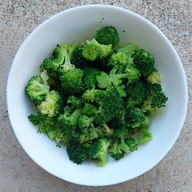Cruciferous Veggies
- Maya Simand

- Feb 4, 2022
- 1 min read
Updated: Dec 16, 2022

Cruciferous veggies are a diverse group that includes:
Arugula (also called rocket).
Bok choy.
Broccoli.
Brussels sprouts.
Cabbage.
Cauliflower.
Chard.
Collard and mustard greens.
Daikon radish.
Horseradish.
Kale.
Kohlrabi.
Radish.
Rapini (broccoli rabi).
Rutabaga.
Turnip.
Wasabi.
Watercress.
To begin with, cruciferous vegetables contain lots of:
Soluble and insoluble fiber.
Vitamin C.
Vitamin B9 (folate).
Potassium.
Selenium.
Phytochemicals.
In addition, cruciferous vegetables contain a group of substances known as glucosinolates, which are sulfur-containing chemicals. These chemicals are responsible for the pungent aroma and bitter flavor of cruciferous vegetables (1).
During food preparation, chewing, and digestion, the glucosinolates in cruciferous vegetables are broken down to form biologically active compounds such as indoles, nitriles, thiocyanates, and isothiocyanates (2). Indole-3-carbinol (an indole) and sulforaphane (an isothiocyanate) have been most frequently examined for their anticancer effects.
Indole a type of chemical found in plants and in certain vegetables, such as broccoli, cabbage, and cauliflower. Indoles may promote good health and are being studied in the prevention of certain types of cancer, including breast cancer, prostate cancer, and colon cancer. An indole is a type of phytochemical (4)
Indoles and isothiocyanates have been found to inhibit the development of cancer in several organs in rats and mice, including the bladder, breast, colon, liver, lung, and stomach (2, 3). Studies in animals and experiments with cells grown in the laboratory have identified several potential ways in which these compounds may help prevent cancer:
They help protect cells from DNA damage.
They help inactivate carcinogens.
They have antiviral and antibacterial effects.
They have anti-inflammatory effects.
They induce cell death (apoptosis).
They inhibit tumor blood vessel formation (angiogenesis) and tumor cell migration (needed for metastasis).
Make cruciferous vegetables part of your diet.
.png)



















Comments